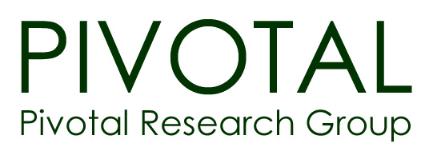Wall St. Speaks Out on FB, Google, Twitter & Yahoo - Pivotal Research

Last week we updated our models and price targets for companies we cover related to internet advertising and digital marketing services. Price target changes were primarily a function of changes to costs of capital embedded in our models which we have incorporated across our coverage universe. In our valuation framework, lower long-term costs of capital (driven at this time by falling yields on long-term treasury bonds) disproportionately impact companies whose stock prices are disproportionately dependent upon their terminal values. Each of Facebook, Google, Twitter and Salesforce.com remain as Buy-rated. We continue to rate Yahoo Hold, although we note that a majority of its value is dependent upon the value of Alibaba.
Facebook remains our favorite name in the sector. Our YE2015 price target is $105, up from $103 previously. Facebook can point to a wide range of factors which will sustain growth through 2015 and beyond, as increasing share of spending from small businesses and large brands alike as well as ongoing improvement in focus on performance-based marketers. Instagram is proving to be a successful enterprise in its own right and WhatsApp continues to gain traction among consumers around the world (although monetization is likely to be modest relative to its user base for an extended period of time). Efforts to establish an extended ad network, buttressed by LiveRail, Atlas and additional acquisitions or internal investments will also provide meaningful growth in the future.
There are other illustrations of the company's potential to continue growing rapidly in the long-run: while Facebook has not captured meaningful budgets that would otherwise have gone to traditional television network owners so far, efforts to incorporate media-brand-adjacent video content (as illustrated via recent agreements with the NFL and ABC News) will help towards these ends over time. The establishment of a portal for video content akin to YouTube may also help Facebook given the success that Google has had in monetizing that property with some marginal TV-focused advertising budgets.
Perhaps the most important factor impacting Facebook's top-line in the near-term will relate to the degree to which app install ads might remain as a significant contributor to growth. Although we have heard much about the notion that many of the earlier app developers might be pursuing uneconomical strategies (i.e. paying to promote installations of apps that get downloaded but rarely used) and that therefore the boom in app install ads might face some limits, it seems increasingly likely to us that there is more growth to come from this segment of advertisers, especially as large brands increasingly develop and promote apps of their own.
Across the whole business, our model incorporates revenue growth estimates of 49.3% for 4Q14 and 44.3% for FY2015. We presume margin compression during 2015 as management has indicated the year would be one for significant investment but we also expect an eventual resumption of 2014 level margins after 2016 before descending again in subsequent years. Our valuation on Facebook on a YE2015 basis is now $309bn, or $105/share. We continue to rate Facebook BUY.
At Google, which we recently upgraded to Buy from Hold, many of the negative considerations we have been focused on in recent years have become more widely held among the investment community. These include compressing margins, investment of capital away from the company's core competencies and weak government relations among other issues. While these concerns are real, we believe they are more-than incorporated into the company's valuation at its current levels. More importantly, the company isn't going anywhere: along with Facebook, Google will maintain a hegemonic position in digital advertising.
We continue to expect significant cash generation from the company despite its ongoing capital expenditures in and around its core business and few of the threats facing Google are likely to have a meaningful impact. We think that currencies will weigh on Google's top-line growth disproportionately in this quarter and for the year ahead, with around a 4% headwind on topline revenue growth by our estimates for 4Q14, (although Facebook has similar international exposure, a several percentage point headwind on total revenues will be more pronounced for Google). In total we estimate reported gross revenue growth of 15.8% during 4Q14.
At the same time, we slightly diminish the long-term mix of revenue we expect Google to generate from third parties (such as Mozilla). This serves to highlight a key wildcard in Google's revenue ex-TAC and line items further down the income statement: we believe that the company's efforts to cull network partners (mostly due to partner site quality issues) in recent years provides Google with significant flexibility in terms of capturing incremental revenue ex-TAC in any given period (our guess is that a loss of inventory supply has only a limited impact on total demand for Google's paid search product, meaning that if demand remains stable, fewer network partners means more revenue, operating income and cashflow for Google, all else equal. Our valuation on Google on a YE2015 basis is $425bn (including $79bn in cash), or $610/share, down slightly from $620 previously. We continue to rate Google BUY.
Twitter is another company we recently upgraded to BUY from HOLD. Our price target on Twitter is rising both because of the cost of capital changes described above (disproportionately impactful on a company like Twitter which will not produce cashflow for many years into the future) and also because we think there is a growing basis for positivity around the company's ability to monetize its platform.
Twitter is evidently pursuing a more aggressive effort to monetize consumers who visit Twitter properties but do not log in. As well, Twitter is beginning to monetize its feeds which run on other media properties. Further, we are mindful of efforts to expand the company's advertiser base which include enabling targeting by mobile carrier (helpful for capturing revenue from carriers and device makers alike given Twitter's heavy consumption skew on mobile devices). As well, the launch of Tailored Audiences for mobile apps (which should help to monetize spending on app installations from brands and performance marketers alike) is illustrative of these efforts, too. Perhaps most importantly, commentary we hear from the advertising community remains overwhelmingly positive, as Twitter's ad sales force continues to perform well, deepening relationships with the industry and helping brands find new ways to use the ad products that Twitter has on offer.
Given these successes, the focus that many investors and the press have placed on the leadership at Twitter seems unnecessary . It is clear that Twitter has underperformed on certain key metrics related to user trends, at least relative to expectations it caused most of Wall Street to hold. And of course, there has been turnover in the senior ranks. However, we think the problem has been that Twitter generally operates like a very large late stage venture funded company rather than a more mature public one. This means that we shouldn't be surprised if the company pursues what might be aspirational goals (investors need to decide for themselves how realistic those aspirations are) and a "fail fast" mentality which produces turnover in the executive ranks. For Twitter's position in the advertising industry, this is mostly well and good, so long as the company is delivering with its paying customers, advertisers. We believe it is.
As Twitter is maintaining its traction, we think it is appropriate to increase our revenue estimates on the company for this year and next. Following a more than doubling of size this year, our estimates previously incorporated a very conservative 20%+ growth rate in 2016 and beyond, or a level slightly above the digital advertising industry's growth rate from this year's plateau. However, we have increasing confidence in the company's ability to outperform this level by finding new segments of marketers who will find Twitter to be an impactful supplier of advertising inventory, and thus our model incorporates slightly higher growth in 2015 and much higher growth in 2016 (up to around 40%).
For 4Q14 we forecast revenues of $476mm (equal to 96.1% growth), which compares with guidance for between $440-$450mm. Our revenue figure is based upon a multiplier we apply to two quarters' prior sales and marketing expense, as this is the line item (and the lag) we think most appropriately can be used to drive ad revenue expectations. We think that traction in the fourth quarter has accelerated incrementally, leading us to use an incrementally higher multiplier vs. the multiplier derived for 3Q14. Our valuation on the company's equity is now $36bn, which we apply against 710mm shares on a YE2015 basis to derive our new $50 price target vs. $42 previously. Half of the increase is due to upwardly revised revenue estimates and half of the increase is due to the aforementioned changes to our cost of capital estimates. We continue to rate Twitter BUY.
Meanwhile, Yahoo's value seemingly couldn't be more removed from its core business if it tried, and the subjectivity associated with valuing its components remains challenging given the range of possible paths forward. Alibaba and Yahoo Japan shares are by themselves worth $49 per share if no taxes were ever paid on the disposition of those assets. But taxes payable on a straightforward sale – if one occurred – could amount to around 40%, or nearly $20 per share. This is, of course, behind Yahoo management's stated intentions to find a tax efficient approach towards realizing value from its ownership of these assets. However, on the two prior instances during which shares were sold, full taxes were paid, and specific plans regarding management's preferred tax strategy has not been forthcoming so far. This has led us to incorporate the highly conservative assumption that full taxes would be paid on future dispositions as well. Whether because of, er, "prompting" by the activist investor Starboard or because management had planned to do something around this point in time (following the Alibaba IPO) all along, we expect management will state their intentions around monetizing the Alibaba shares by the time of the 4Q14 earnings call later this month.
Still, despite Starboard's conveyance of concern regarding reports that Yahoo was considering a cash-rich split-off as a strategy, we think something of this nature is probably still on the table as far as Yahoo management is concerned . Tax leakage, a sub-optimal valuation on the Asian assets, transaction completion issues and the high potential of further obfuscation of Yahoo's core business are among the risks associated with a cash-rich split. But that doesn't mean it isn't the preferred strategy for the company's management. It is also possible that Yahoo would decide that a preferred tax minimization strategy is unfeasible at this time for some reason, in which case perhaps a small percentage of the company's holdings in these assets might be sold (with full taxes paid) in order to raise cash for further buybacks, acquisitions or both.
Of course, anything other than an approach which the investment community broadly accepts as optimal could very well lead to a proxy fight that Starboard would have a good chance of winning. And if this were the case, a scenario involving a trade of Yahoo's core operating business to another entity such as AOL seems highly likely and mutually beneficial, producing significant value over an extended time frame. In short, we think there are plausible scenarios where Yahoo will pay a 40% tax rate and there are plausible scenarios where Yahoo will pay next to nothing. Taking these and other scenarios into account, we think assuming the mid-range of this tax rate most appropriately accounts for the range of likely outcomes vs. our prior assumption, we drive our price target for all of Yahoo up to $54 on a YE2015 basis vs. $47 previously.
Almost as an aside, there is positive activity at the core business worth noting. Acquisitions of BrightRoll and Flurry last year could generate an incremental $150-$200mm in net display (ex-TAC) revenue and $400-$500mm in incremental gross revenue during 2015, although at a lower net profit margin than Yahoo's legacy business. As well, November's agreement with Mozilla should several hundred million dollars of gross search revenue, and probably some incremental net revenue, too (although we note that Yahoo's incremental gains in search query volumes will probably not be matched by growth in revenues, as most advertisers will continue to concentrate their search budgets with Google). None of these factors will have a meaningful impact on 4Q14 results, but we would expect them to be incorporated into 2015 guidance if it is provided during the upcoming earnings call. Of course, core display revenue is likely still declining, and search growth may have otherwise decelerated as prior improvements would otherwise be lapped. Still, on balance we see these actions as well as the recent hiring of a well-respected head of ad sales for the Americas as favorable for Yahoo if the business continues to evolve under its current operating and management structure. As a subset of the aforementioned $54 valuation for all of Yahoo, we continue to value core Yahoo (including its operations and cash on its balance sheet) as worth $15bn at YE2015, or around $16 per share. Our rating on Yahoo remains HOLD.
Lastly, we are altering our price target on Salesforce.com to $80 vs. our prior $74 figure. We are leaving our operating expectations unchanged on Salesforce.com at this time, but are instead incorporating new coverage universe-wide costs of capital, which disproportionately increases our valuation of Salesforce.com given the degree to which its valuation is dependent upon the cashflow it can produce beyond our model's terminal year.
We are mindful that the competitive landscape in marketing technology has come to increasingly favor Oracle and Adobe in recent quarters, especially given the recent acquisitions those companies have made. While acquisitions are not the be-all and end-all (organic growth is still most important) Oracle and Adobe have made more progress in shaping the marketing cloud offerings which we think will be core long-term drivers of CMO-driven technology budgets.
While we also recognize that most purchases of marketing technologies are bought as point solutions, at the same time, the market seems to be clearly moving in a direction which favors suites (we think this reflects what marketers want, too). This concern was amplified by last month's acquisition of Datalogix by Oracle, which we expect will be a powerful combination alongside Oracle's other recent buys (at least so long as those assets and key personnel are appropriately integrated). Still, it is early days for this sector and Salesforce.com should continue to grow at a much more rapid clip than the rest of our coverage universe for an extended time frame, as the marketing automation and marketing technology industry continues to offer significant opportunity. Further, Salesforce.com retains a strong presence in this space given its dominance of middle-market CRM solutions, and from this base the company retains a solid overall position.
In terms of valuation, primary among our assumptions is the notion that the company can produce $10bn in gross profit by our terminal year, the company's fiscal 2020, more than double what Salesforce.com should see during fiscal 2016. This should translate into cashflow of around $2.8bn in 2020, also around double 2016 levels, with still-rapid growth ahead from that point on. From these figures, our valuation on Salesforce.com is $52bn on a fiscal YE2016 basis, or $80 per share. We continue to rate Salesforce.com BUY.
REPORT INCLUDING DISCLOSURES CAN BE FOUND HERE: Madison and Wall 1-16-15.pdf
Brian Wieser is a Senior Analyst at Pivotal Research Group, where he covers securities which are impacted by the advertising economy, including Facebook, Google, Yahoo, Interpublic, Omnicom, WPP, Publicis, Nielsen, CBS, Viacom and Discovery Communications. Brian can be reached at brian@pvtl.com.
Publicis, Nielsen, CBS, Viacom and Discovery Communications. Brian can be reached at brian@pvtl.com.
Read all Brian's MediaBizBloggers commentaries at Brian Wieser's Pivotal Report.
Check us out on Facebook at MediaBizBloggers.com
Follow our Twitter updates @MediaBizBlogger
The opinions and points of view expressed in this commentary are exclusively the views of the author and do not necessarily represent the views of MediaBizBloggers.com management or associated bloggers. MediaBizBloggers is an open thought leadership platform and readers may share their comments and opinions in response to all commentaries.


